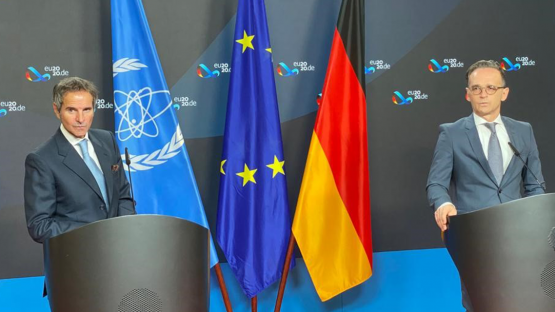Germany is demonstrating continued strong support for the IAEA’s mission to foster global peace and development even as the country is shutting down its nuclear power plants, Director General Rafael Mariano Grossi said after meeting Foreign Minister Heiko Maas and other senior German officials in Berlin today.
“Germany is – and will remain also in the future – a very important and highly valued IAEA Member State. My first visit to Berlin since I took office last December aims to further expand and deepen our already close cooperation,” Mr Grossi said as he began a two-day official visit. While in the German capital, he is also taking part in the World Health Summit – this year held virtually – to discuss the IAEA’s role in the fight against cancer and diseases that spread from animals to humans, like COVID-19.
At a press conference after their meeting, Foreign Minister Maas praised the IAEA’s work, thanking Director General Grossi for maintaining the Agency's non-proliferation inspection activities during the pandemic, which caused major travel disruptions in the world. He said this strengthened trust in the IAEA and gave hope for multilateralism in other fields. “We highly appreciate the work done by the IAEA. We see that we need your work so much these days,” he said.
Germany was among a group of countries that quickly stepped in with new financial commitments to ensure that the IAEA’s safeguards work was not interrupted during the COVID-19 outbreak. With this funding, the IAEA could charter its own plane for the first time to get its safeguards inspectors into the field, including to Iran.
The European Union country also joined other IAEA Member States in backing an Agency project to provide nuclear-derived testing equipment as well as training and expertise to some 125 countries in order to help them quickly detect the coronavirus among their people. As the largest-ever operation in the Agency’s history, it was only made possible thanks to generous support from countries like Germany.
“Foreign Minister Maas and other high-ranking German officials made clear their strong appreciation of our safeguards work as well as our efforts to help countries around the world address some of the most urgent challenges of today,” Mr Grossi said. He added that the Foreign Minister had expressed interest in ZODIAC (Zoonotic Disease Integrated Action), a new IAEA initiative to use nuclear techniques and an international network of laboratories to help prevent future pandemics. “It is my impression that Germany is as committed as ever to supporting the Agency, even though the country has decided to opt out of nuclear power as a source of energy.”
Germany has also been taking a leading role – diplomatically and financially – in the extensive and much needed modernisation in recent years of the IAEA’s eight nuclear application laboratories in Seibersdorf outside Vienna, enabling the Agency to step up its technical and scientific assistance to countries in improving human health, bolstering food security, mitigating climate change, suppressing insect pests and much else.
“Largely thanks to these state-of-the-art laboratories, the IAEA is making an increasingly important contribution to achieving the Sustainable Development Goals. Their upgrade is a major undertaking that is continuing to require significant extrabudgetary funding from Member States, for which we are very grateful,” Mr Grossi said.







